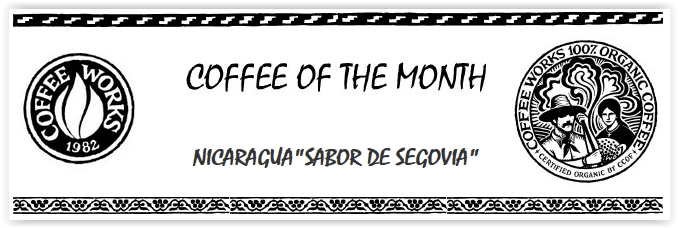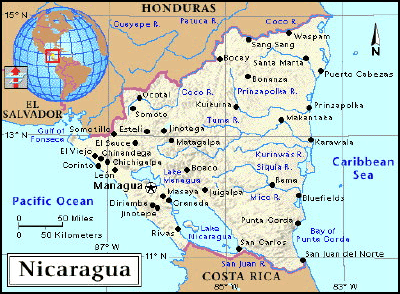Nicaragua “Sabor de Segovia”

Cooperatively Organic
In Northwestern Nicaragua, where the Coco river runs through the mountainous Segovia district, several hundred small coffee growers form a coffee growing cooperative known as the Prode Co-Op. Prode was organized during the reign of the Sandinista government, to bolster the living standard of Nicaragua’s farm families.
Each farmer carefully tends his family’s one to two acre plot in the steep, inaccessible terrain. The coffee trees are grown under partial shade to protect them from the equatorial sun, and the fully ripe cherries are picked by hand. The farmers bring them to the cooperatively-owned mill, where they are washed in the pristine river water and layed out to dry in the sun.
 Prode is a certified organic producer; Absolutely no pesticides, herbicides, or chemical fertilizers are used on the farms, or in the processing and transportation of the coffees. The best of their production, meaning the highest grown (over 4000’) and largest beans, is sold under the “Sabor de Segovia” (Flavor of Segovia) label.
Prode is a certified organic producer; Absolutely no pesticides, herbicides, or chemical fertilizers are used on the farms, or in the processing and transportation of the coffees. The best of their production, meaning the highest grown (over 4000’) and largest beans, is sold under the “Sabor de Segovia” (Flavor of Segovia) label.
A couple of years ago we received a note from our green bean broker who was traveling through Nicaragua and Costa Rica. The message goes to the heart of the difference between “hand-made” coffees like this one and commercially produced coffees:
“Large, handsome, pale gren to blue… often showing fancy roast and acidly full-bodied cup.” –William Ukers (on Nicaraguan coffee), All About Coffee (1935)
“While Nicaragua and Costa Rica border one another geographically,” he wrote, “the 2 nations differ radically in their methods of green coffee cultivation, handling and processing. In Nicaragua, coffee is grown primarily under shade trees, only ripe cherries are picked, growers wet process their own coffee and turn it over to dry mills in desiccated reaches for sun drying and final preparation, while in Costa Rica coffee farms frequently resemble mono-cultural vineyards, mass harvesting is practiced, and growers immediately relinquish their freshly picked cherries to vast Orwellian highly mechanized wet and dry mills, where the coffee never sees the light of day again until it shows up in your coffee cup. While the efficiency of the Costa Ricans is noteworthy, the intimacy of the Nicaraguans is remarkable.”
This “intimacy” is undoubtedly what gives this handmade organic Nicaragua coffee its rich full body and satisfying earthy goodness. We were crazy for this coffee in 1998 and re-booked a generous supply for your enjoyment this year.


